NTC Pedagogy For Primary And JHS Questions And Answers (Methods Of Teaching Primary And JHS)
NTC Pedagogy For Primary And JHS Questions And Answers
NTC SHS Pedagogy Questions And Answers (Methods Of Teaching) 1
NTC SHS Pedagogy Questions And Answers (Methods Of Teaching) 2
NTC SHS Pedagogy Questions And Answers (Methods Of Teaching) 3
NTC SHS Pedagogy Questions And Answers (Curriculum Development) 1
NTC SHS Pedagogy Questions And Answers (Curriculum Development) 2
Content Areas For SHS Pedagogy For NTC Exams September 2023 Questions And Answers
NTC PEDAGOGY PAST QUESTIONS (SAMPLE QUESTION ON PEDAGOGY OF EDUCATION)
JOIN US ON WHATSAPP HERE
- Which teaching method places the teacher as the central authority figure in the classroom?
a) Teacher-centered
b) Child-centered
Answer: a) Teacher-centered
2. In a teacher-centered approach, who is considered the primary source of knowledge?
a) Students
b) Parents
c) Teacher
Answer: c) Teacher
3. Which teaching method emphasizes student autonomy and active learning?
a) Teacher-centered
b) Child-centered
Answer: b) Child-centered
NTC Pedagogy For Primary And JHS Questions And Answers (Curriculum)
NTC Pedagogy For Primary And JHS Questions And Answers (Methods Of Teaching Primary And JHS) 1
NTC Pedagogy For Primary And JHS Questions And Answers (Methods Of Teaching Primary And JHS) 2
JOIN US ON WHATSAPP HERE
4. In a child-centered approach, who takes ownership of their learning?
a) Teachers
b) Students
c) Parents
Answer: b) Students
5. Which teaching method focuses on transmitting information to students?
a) Teacher-centered
b) Child-centered
Answer: a) Teacher-centered
6. In a child-centered approach, what is emphasized during assessment?
a) Final outcomes only
b) Learning process as well as outcomes
c) Memorization of facts
Answer: b) Learning process as well as outcomes
7. Which teaching method promotes collaboration and teamwork among students?
a) Teacher-centered
b) Child-centered
Answer: b) Child-centered
8. Who is responsible for constructing their own understanding of the subject matter in a child-centered approach?
a) Teachers
b) Students
c) Parents
Answer: b) Students
NTC Pedagogy For Primary And JHS Questions And Answers (Curriculum)
NTC Pedagogy For Primary And JHS Questions And Answers (Methods Of Teaching Primary And JHS) 1
NTC Pedagogy For Primary And JHS Questions And Answers (Methods Of Teaching Primary And JHS) 2
JOIN US ON WHATSAPP HERE
9. Which teaching method personalizes instruction to meet the unique needs of each student?
a) Teacher-centered
b) Child-centered
Answer: b) Child-centered
10. Which teaching method often involves lectures and demonstrations by the teacher?
a) Teacher-centered
b) Child-centered
Answer: a) Teacher-centered
11. In a child-centered approach, what is the focus of assessment?
a) Final outcomes only
b) Learning process as well as outcomes
c) Memorization of facts
Answer: b) Learning process as well as outcomes
12. Which teaching method aims to nurture critical thinking and problem-solving skills?
a) Teacher-centered
b) Child-centered
Answer: b) Child-centered
13. Who is the primary authority figure in a teacher-centered approach?
a) Students
b) Parents
c) Teacher
Answer: c) Teacher
14. In a child-centered approach, what is the role of the teacher?
a) Imparting knowledge to students
b) Facilitating and guiding student learning
c) Evaluating student performance
Answer: b) Facilitating and guiding student learning
15. Which teaching method emphasizes the holistic development of students?
a) Teacher-centered
b) Child-centered
Answer: b) Child-centered
NTC Pedagogy For Primary And JHS Questions And Answers (Curriculum)
NTC Pedagogy For Primary And JHS Questions And Answers (Methods Of Teaching Primary And JHS) 1
NTC Pedagogy For Primary And JHS Questions And Answers (Methods Of Teaching Primary And JHS) 2
JOIN US ON WHATSAPP HERE
16. In a teacher-centered approach, who determines the pacing and sequencing of lessons?
a) Students
b) Parents
c) Teacher
Answer: c) Teacher
17. Which teaching method encourages students to ask questions and conduct research?
a) Teacher-centered
b) Child-centered
Answer: b) Child-centered
18. Who has the primary responsibility for learning in a child-centered approach?
a) Teachers
b) Students
c) Parents
Answer: b) Students
19. Which teaching method often involves group work and discussions among students?
a) Teacher-centered
b) Child-centered
Answer: b) Child-centered
20. In a teacher-centered approach, what is the primary focus?
a) Individual student needs and interests
b) Covering the curriculum and transmitting information
c) Student autonomy and active learning
Answer: b) Covering the curriculum and transmitting information
NTC Pedagogy For Primary And JHS Questions And Answers (Curriculum)
NTC Pedagogy For Primary And JHS Questions And Answers (Methods Of Teaching Primary And JHS) 1
NTC Pedagogy For Primary And JHS Questions And Answers (Methods Of Teaching Primary And JHS) 2
JOIN US ON WHATSAPP HERE
14. Which teaching method involves students working together in small groups to achieve a common goal? a) Lecture
b) Discussion
c) Cooperative learning
d) Socratic method
Answer: c) Cooperative learning
15. Which teaching method encourages students to explore a topic through questioning, discovering information, and drawing conclusions?
a) Lecture
b) Direct instruction
c) Inquiry-based learning
d) Flipped classroom
Answer: c) Inquiry-based learning
16. Which teaching method uses videos or online resources for students to learn new information outside the classroom?
a) Cooperative learning
b) Direct instruction
c) Flipped classroom
d) Project-based learning
Answer: c) Flipped classroom
17. Which teaching method involves the teacher providing explicit instructions and modeling how to solve problems or complete tasks?
a) Cooperative learning
b) Inquiry-based learning
c) Direct instruction
d) Socratic method
Answer: c) Direct instruction
18. Which teaching method promotes active engagement and personal connection to the content through direct experiences?
a) Socratic method
b) Experiential learning
c) Project-based learning
d) Flipped classroom
Answer: b) Experiential learning
19. Which teaching method encourages students to exchange ideas and express their opinions on a given topic?
a) Lecture
b) Discussion
c) Project-based learning
d) Cooperative learning
Answer: b) Discussion
NTC Pedagogy For Primary And JHS Questions And Answers (Curriculum)
NTC Pedagogy For Primary And JHS Questions And Answers (Methods Of Teaching Primary And JHS) 1
NTC Pedagogy For Primary And JHS Questions And Answers (Methods Of Teaching Primary And JHS) 2
JOIN US ON WHATSAPP HERE
20. Which teaching method involves the teacher asking open-ended questions to help students develop critical thinking skills?
a) Direct instruction
b) Flipped classroom
c) Inquiry-based learning
d) Socratic method
Answer: d) Socratic method
21. Which teaching method uses extended projects that require students to apply what they have learned to real-world situations?
a) Experiential learning
b) Project-based learning
c) Cooperative learning
d) Inquiry-based learning
Answer: b) Project-based learning
22. Which teaching method incorporates technology tools, such as computers or interactive whiteboards, to enhance teaching and learning?
a) Socratic method
b) Technology-enhanced learning
c) Discussion
d) Direct instruction
Answer: b) Technology-enhanced learning
23. Which teaching method is useful for delivering large amounts of content through oral communication?
a) Flipped classroom
b) Direct instruction
c) Cooperative learning
d) Inquiry-based learning
Answer: b) Direct instruction
NTC Pedagogy For Primary And JHS Questions And Answers (Curriculum)
NTC Pedagogy For Primary And JHS Questions And Answers (Methods Of Teaching Primary And JHS) 1
NTC Pedagogy For Primary And JHS Questions And Answers (Methods Of Teaching Primary And JHS) 2
JOIN US ON WHATSAPP HERE
24. A child with average potential intelligence but fertile environment will achieve—
A. A better life
B. An average life
C. Nothing in life
D. Everything in life
Answer : A. A better life
25. Siblings, parents and teachers are important source of ………. for the children.
A. Motivation
B. Information
C. Opinions
D. Attitudes
Answer : A. Motivation
26. A good understanding of ……….. makes us know about ourselves better.
A. Education
B. Colours
C. Social perception
D. None of the rest
Answer : A. Education
27.. Good tests of a psychological nature bear the following features—
A. Reliability
B. Cheaper
C. Guessing Power
D. Rote learning
Answer : A. Reliability
28. Mental Health is—
A. Harmonious functioning of the total personality
B. Symptoms of maladjustment
C. Terrible excitement
D. Throwing up temper-tantrums
Answer : A. Harmonious functioning of the total personality
29.. During the ………….. children are faced with a problem of coping with school.
A. Toddlerhood
B. Pro-social period
C. Preschool period
D. Middle childhood
Answer : C. Preschool period
30. The best way to memorize is—
A. Study for long time
B. To understand the concept
C. To read loudly
D. To write the concept
Answer : B. To understand the concept#
NTC Pedagogy For Primary And JHS Questions And Answers (Curriculum)
NTC Pedagogy For Primary And JHS Questions And Answers (Methods Of Teaching Primary And JHS) 1
NTC Pedagogy For Primary And JHS Questions And Answers (Methods Of Teaching Primary And JHS) 2
JOIN US ON WHATSAPP HERE
31. Students like that teacher who—
A. Has attractive personality
B. Belongs to his/her caste
C. Awards goods work liberally
D. Has very good knowledge of his/her subject
Answer : D. Has very good knowledge of his/her subject
32. With the development of technology, the role of teacher in future will be—
A. To provide information
B. To develop new text-books
C. To guide students
D. To use internet in teaching
Answer : C. To guide students
33. To prepare students as good citizen, a teacher should—
A. Maintain strict discipline
B. Provide good leadership
C. Be good orator
D. Have good general knowledge
Answer : B. Provide good leadership
34. Students should be given home-work to—
A. Study at home
B. Check their progress by teachers
C. Keep them busy
D. develop habit of self-study
Answer : D. develop habit of self-study
35. It is necessary for the development of school—
A. Principal and teacher
B. Students
C. Good building
D. Other facilities
Answer :B. Students
NTC Pedagogy For Primary And JHS Questions And Answers (Curriculum)
NTC Pedagogy For Primary And JHS Questions And Answers (Methods Of Teaching Primary And JHS) 1
NTC Pedagogy For Primary And JHS Questions And Answers (Methods Of Teaching Primary And JHS) 2
JOIN US ON WHATSAPP HERE
36. If a student comes late in class, then you—
A. Will ignore him
B. Will not allow him to sit in class
C. Will punish him
D. Will allow him to sit silently
Answer :D. Will allow him to sit silently
37. The purpose of National Education Policy is—
A. Universalisation of primary education
B. Vocationalisation of education
C. To review the education
D. To give equal opportunity of education to all
Answer :C. To review the education
38. A teacher learns most by—
A. His students
B. His colleagues
C. His Principal
D. His experiences during training
Answer :D. His experiences during training
39. On first day in a class you will—
A. Start teaching from first chapter
B. Take introduction of students and introduce yourself
C. Explain the syllabus
D. Explain the rules of school and your teaching way
Answer :B. Take introduction of students and introduce yourself
40. The standard of education can be raised by—
A. Appointing good teachers
B. Providing physical facilities in schools
C. Reforming examination system
D. Providing computer in schools
Answer :A. Appointing good teachers
41. During teaching, a teacher gives example—
A. To attract student’s attention
B. To make lesson interesting
C. To explain the lesson
D. To continue the lesson for long time
Answer :C. To explain the lesson
NTC Pedagogy For Primary And JHS Questions And Answers (Curriculum)
NTC Pedagogy For Primary And JHS Questions And Answers (Methods Of Teaching Primary And JHS) 1
NTC Pedagogy For Primary And JHS Questions And Answers (Methods Of Teaching Primary And JHS) 2
JOIN US ON WHATSAPP HERE
42. If students are not taking interest in your teaching, then you will—
A. Ignore them
B. Leave the class
C. Ask them to pay attention
D. Change the teaching method
Answer :D. Change the teaching method
43. According to you, the aim of education should be—
A. To provide knowledge
B. To develop personality
C. To make good ctizen
D. To reform the society
Answer :B. To develop personality
44) In pedagogy computer is used-
A. To motivate the learner
B. To provide feedback
C. To interact with the learner
D. For all the above
Answer :D. For all the above
45) Which of the following is die brain of the computer ?
A. Programme
B. Central processing unit
C. Memory
D. Hard Disc
Answer :B. Central processing unit
47. The concept of school complex was first executed in-
A. Uttar Pradesh
B. Madhya Pradesh
C. Bihar
D. Rajasthan
Answer :D. Rajasthan
48. The proponent of the Cognitive Theory of teaching is-
A. N. L. Gage
B. Shiv Kumar Mitra
C. B. F. Skiner
D. McDonald
Answer :A. N. L. Gage
NTC Pedagogy For Primary And JHS Questions And Answers (Curriculum)
NTC Pedagogy For Primary And JHS Questions And Answers (Methods Of Teaching Primary And JHS) 1
NTC Pedagogy For Primary And JHS Questions And Answers (Methods Of Teaching Primary And JHS) 2
JOIN US ON WHATSAPP HERE
49. Instruction medium affects the absence and escape from class teaching-
A. Agreed
B. Indefinite
C. Disagreed
D. None of the above
Answer :A. Agreed
50. The determinant of teaching skill training is-
A. Components
B. Pupil-teacher
C. Supervisor
D. Headmaster
Answer :A. Components
51. For a good communication ..…… is requried.
A. Clarity of thought
B. Dramatic Presentation
C. Speaking in a mild tone
D. Speaking without pause
Answer :A. Clarity of thought
52. Which of the following is an approach to educational planning ?
A. Man-power approach
B. Social Demand approach
C. Both A. and (B)
D. None of the above
Answer :C. Both A. and (B)
53. Institutional planning should be based on-
A. Aim and needs
B. Time—table
C. Administration
D. Need
Answer :A. Aim and needs
54. Teacher behaviour ought to be-
A. Administrative
B. Instructive
C. Idealistic
D. Directive
Answer :C. Idealistic
55. Information highway or net is-
A. Computer
B. Internet
C. Intranet
D. Key-board
Answer :B. Internet
NTC Pedagogy For Primary And JHS Questions And Answers (Curriculum)
NTC Pedagogy For Primary And JHS Questions And Answers (Methods Of Teaching Primary And JHS) 1
NTC Pedagogy For Primary And JHS Questions And Answers (Methods Of Teaching Primary And JHS) 2
JOIN US ON WHATSAPP HERE
56. Computer language is based on-—
A. Number system
B. Symbol system
C. Series system
D. None of the above
Answer :A. Number system
57. The main task of educational computer is-
A. Scoring the answers
B. Preserve the information
C. Analysis of data
D. All of the above
Answer :D. All of the above
58. UNESCO satellite directed television program was used first
A. 1926
B. 1959
C. 1961
D. 1965
Answer :D. 1965
59. In which of the following instructional procedure is the main component ?
A. Synectics teaching model
B. Basic teaching model
C. Inductive model
D. Social-stimulation
Answer :B. Basic teaching model
60. The computer based teaching model has been developed by-
A. Gilbert (1962)
B. Stolurow and Davis (1965)
C. Robert Gagne (1965)
D. Mecner (1965)
Answer :B. Stolurow and Davis (1965)
NTC Pedagogy For Primary And JHS Questions And Answers (Curriculum)
NTC Pedagogy For Primary And JHS Questions And Answers (Methods Of Teaching Primary And JHS) 1
NTC Pedagogy For Primary And JHS Questions And Answers (Methods Of Teaching Primary And JHS) 2
JOIN US ON WHATSAPP HERE
61. Which of the following expectation students have from group learning ?
A. To get appreciation from the group
B. To distribute the work equally
C. To ignore individual view point
D. To attract isolated student towards the group
Answer :D. To attract isolated student towards the group
61. In order to modify the undesirable behaviour of a student the most effective method is-
A. To punish the student
B. To bring it to the notice of parents
C. To find out the reasons for the undesirable behaviour and provide remedies
D. To ignore it
Answer :C. To find out the reasons for the undesirable behaviour and provide remedies
62. In which university the micro-teaching system started in 1961 ?
A. Stanford University
B. Oxford University
C. Delhi University
D. M. S. University Baroda(India)
Answer :A. Stanford Universities
63. The correct meaning of C.A.I. is-
A. Characteristics of Assistant Instructor
B. Computer Assisted Instruction
C. Community Assisted Instruction
D. None of the above
Answer :B. Computer Assisted Instruction
64. Man is born free but every-where he is in chains/’ This statement has been given by-
A. Abraham Maslow
B. Jean Jacques Rousseau
C. John Dewey
D. W. I-I. Kilpatrick
Answer :B. Jean Jacques Rousseau
65. Written communication strategy includes-
A. Algorithms
B. Decision Table
C. Both A. and (B)
D. None of the above
Answer :C. Both A. and (B)
NTC Pedagogy For Primary And JHS Questions And Answers (Curriculum)
NTC Pedagogy For Primary And JHS Questions And Answers (Methods Of Teaching Primary And JHS) 1
NTC Pedagogy For Primary And JHS Questions And Answers (Methods Of Teaching Primary And JHS) 2
JOIN US ON WHATSAPP HERE
66. Main responsibility of School Management lies on-
A. Principal
B. Teachers
C. Manager
D. All of the above
Answer :A. Principal
67. Major objective of School Discipline is-
A. To ensure safety of staff and students
B. To create an environment conducive for teaching
C. Both A. and (B)
D. None of the above
Answer :C. Both A. and (B)
68. At primary level teacher-taught ratio was
A. According to sixth educational survey of all India
B. According to fifth educational survey of all India
C. According to fourth educational survey of all India
D. According to second educational survey of all India
Answer :A. According to sixth educational survey of all India
69. A fault in a computer programme which prevents it from working correctly is known as-
A. Bug
B. Error
C. Boo~Boo
D. Virus
Answer :A. Bug
70. Practical knowledge of language is learnt at—
A. School
B. Language laboratory
C. Language teaching
D. Language instruction
Answer :B. Language laboratory
NTC Pedagogy For Primary And JHS Questions And Answers (Curriculum)
NTC Pedagogy For Primary And JHS Questions And Answers (Methods Of Teaching Primary And JHS) 1
NTC Pedagogy For Primary And JHS Questions And Answers (Methods Of Teaching Primary And JHS) 2
JOIN US ON WHATSAPP HERE
71. Dropping out from school means-
A. To come to school casually
B. To leave the school forever
C. To play truant from class
D. None of the above
Answer :B. To leave the school forever
72. Which one of the following is not a principle of a good time table ?
A. Flexibility
B. Ruthless master
C. Variety
D. Coordination of efforts
Answer :B. Ruthless master
73. The reason of absence and escape from school is—
A. Lack of interest in syllabus
B. Poor method of teaching
C. Ineffective teacher
D. All the above
Answer :D. All the above
74. The scope of Decision-Making is—
A. Management
B. Organization
C. Administration
D. Supervision
Answer :C. Administration
75. Factor of personality is—
A. Ductless glands
B. Family background
C. School
D. All the above
Answer :D. All the above
76. Which of the following aspects is discussed in a Teacher’s Diary ?
A. Class Time Table
B. Teaching Content
C. Both A. and (B)
D. None of the above
Answer :C. Both A. and (B)
NTC Pedagogy For Primary And JHS Questions And Answers (Curriculum)
NTC Pedagogy For Primary And JHS Questions And Answers (Methods Of Teaching Primary And JHS) 1
NTC Pedagogy For Primary And JHS Questions And Answers (Methods Of Teaching Primary And JHS) 2
JOIN US ON WHATSAPP HERE
77. 10 + 2 + 3 system of education was recommended by—
A. Kothari Commission
B. Mudaliar Commission
C. Radhakrishnan Commission
D. National Policy on Education (1986)
Answer : A. Kothari Commission
78. . ………. refers to states within a person or animal that drive behaviour towards some goal.
A. Competence
B. Affiliation
C. Motivation
D. Self-actualisation
Answer : C. Motivation
79. Psychologists who diagnose learning problems and try to remedy them are called …………… Psychologists.
A. Social
B. Community
C. School
D. Clinical
Answer : C. School
80. The concept of state of readiness in maturation is important in understanding development of behaviour because it teaches us that certain skills may be difficult or impossible to learn before a given—
A. Level of teaching
B. Intelligence level
C. Socio-economic level
D. Age level
Answer : D. Age level
NTC Pedagogy For Primary And JHS Questions And Answers (Curriculum)
NTC Pedagogy For Primary And JHS Questions And Answers (Methods Of Teaching Primary And JHS) 1
NTC Pedagogy For Primary And JHS Questions And Answers (Methods Of Teaching Primary And JHS) 2
JOIN US ON WHATSAPP HERE

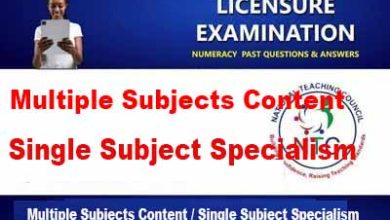
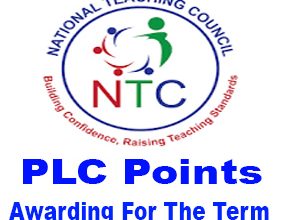
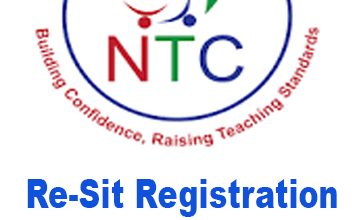
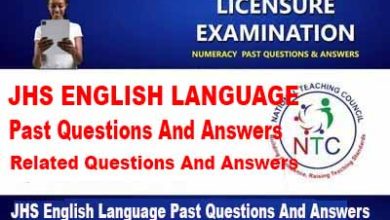
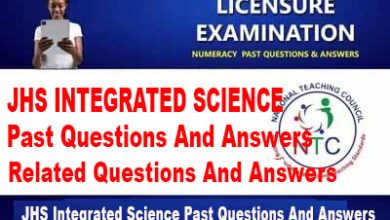
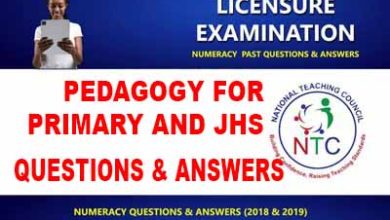
2 Comments